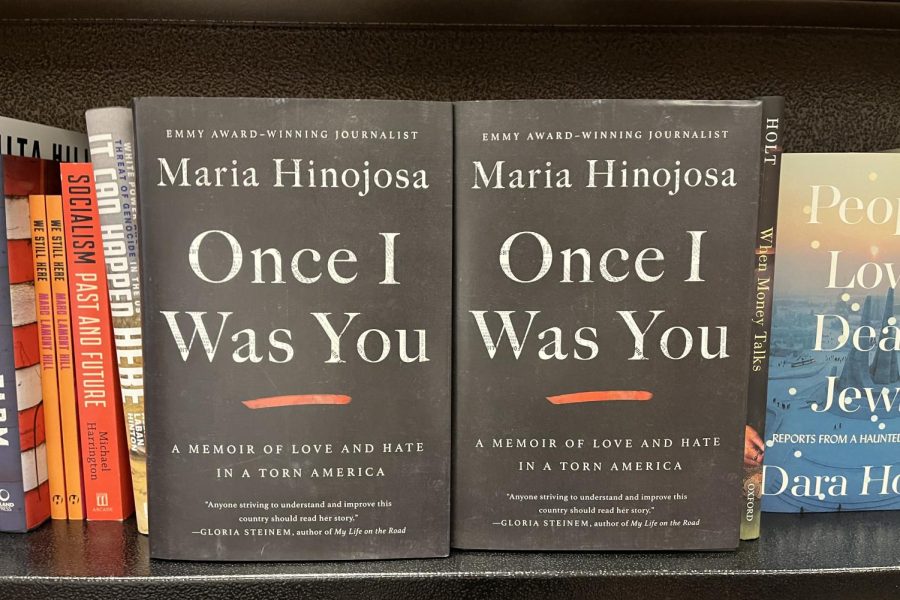Review: Maria Hinojosa’s memoir ‘Once I Was You’ highlights importance of diverse journalism
Photo credit: Lizette Gonzalez
Maria Hinojosa’s memoir “Once I Was You” sits on a book shelf in Barnes and Nobles. Hinojosa’s memoir touches on her personal journey as a journalist and emphasizes the importance of reporting on difficult topics, such as the immigration crisis.
January 7, 2022
Best known as the anchor of “Latino USA,” Maria Hinojosa writes about her intersectional identity as an immigrant and reporter, and what that signifies in journalism’s predominately white field in her memoir “Once I Was You.”
The title itself caught my attention because of the immediate connection the author offers with the reader. With the title, she is directly talking to the community she belongs to: the immigrant Latino community. The title held more significance for me, as a Latina student-journalist myself, it’s empowering to see a fellow immigrant Latina write about our stories.
In the introduction chapter, “A Letter to the Girl at McAllen Airport,” Hinojosa recounts an encounter she had with a 9-year-old girl in the airport who immigrated from Guatemala and was being taken back. Hinojosa describes every detail of their conversation, prompting the reader to actually feel the emotion she had.
The way Hinojosa described how she conversed with the little girl in Spanish was heartbreaking, as it was clear to imagine how scared the 9-year-old felt. Hinojosa wrote, “You are wanted. You are not enemies.”
Hinojosa wrote these words in Spanish, then in English. This moment unleashed the sense of belonging, not only to the little girl, but to all reading. The fact that she wrote it initially in Spanish speaks volumes as it feels more intimate.
This chapter was heart-wrenching, but, ultimately, it is the epitome of this memoir. Hinojosa shares her journalistic instinct of asking questions in difficult situations but also showcases the hard aspects of being a reporter. Hinojosa connected with the little girl because she saw herself in her. She created a space to acknowledge the uncertain experiences many immigrants go through, which Hinojosa describes as “one of the greatest modern horrors of the U.S.A.”
Hinojosa came to the United States when she was a baby and entered with a green card in the 1960s from Mexico, when her father was offered a job at the University of Chicago. At the end of the book, she shares another story of a boy named Bobby. He was running away from the Central American mafia and was sent to a detention camp for nine days. As a reader, this story was important to know since it unified the point that Hinojosa wanted to make: stories like such don’t get told as often as they should.
Hinojosa wrote, “I am you, Bobby. I will attempt to tell your story with respect so you are not silenced and not invisible.”
The intentional similarity of how Hinojosa wrote her personal immigration story and Bobby’s adds depth to one of the book’s main themes.
Hinojosa alluded to the idea that she had privilege when she came to the U.S. Bobby was less privileged, as he immigrated to simply survive violence in his native country. Nonetheless, the juxtaposition Hinojosa made clarified that regardless of their backgrounds, her family and Bobby’s still encountered the same disrespect and discrimination because of their identity.
This point created a deeper level of understanding as it demonstrated, bluntly, the true way immigrants are treated at the border and why shedding light on these stories is important.
Hinojosa’s writing is clear and accessible. The simplicity of her writing makes it possible to get her message across in a more direct and honest way. The clarity humanizes topics that don’t get enough attention.
Additionally, Hinojosa shares the struggles she had in her career when she found herself to be one of the only Latinas in the room. She wrote, “NPR was pretty white, so anytime I saw a person of color there, I noted it. I was the first and only Latina at the NPR news headquarters in DC.”
She shared multiple microaggressions she went through and the difficulties she had of getting access to report on stories in large newsrooms solely because of her background.
Although, at some points, some of her stories felt long, I understood their importance as I read along. She shared her work as an activist, her journey of finding love, how she balanced her work life and being a mother and the trauma she experienced as a female journalist. Every story wove itself to be significant and shed light on the positives and negatives of journalism. Hinojosa demonstrated that before being a journalist, she is a human being.
To present day, Hinojosa has reported for PBS, CBS, CNN and NPR . Throughout the memoir, she recounts the highs and lows she experienced in stories that she reported on that changed her life. Hinojosa wasn’t afraid to mention the tokenization she experienced either, at newsrooms like CNN, as she wrote that “people thought [she] was an affirmative action hire.” Her bluntness offered her readers to come across these conversations authentically.
Hinojosa founded Futuro Media, one of the only non-profit newsrooms that is ran by a Latina. Latino U.S.A is Futuro Media’s award-winning political podcast. In the memoir, Hinojosa wrote that, “This show was devised to respond definitively to the lack of Latino voices and stories on public radio and serve as platform for stories that didn’t find a home on other shows.”
It was empowering to read the creation of this and the existent strive Hinojosa had to make sure the Latino and immigrant community weren’t forgotten. I felt represented as I turned every page.
The book takes readers through her life, moments filled with joy, but moments that moved me to tears too. “Once I Was You” serves to be a call to action. It showcases the reason why diverse journalism is needed. Her writing humanizes the immigration crisis, and also speaks to the truth of what it means to be a woman of color and a journalist.
“It was a story that had been right in front of journalists’ faces for years and yet for them and therefore for the rest of us, these kids were invisible. Their stories didn’t matter,” Hinojosa wrote when reporting on young boys from El Salvador.
“Once I Was You” showed that these stories don’t only matter, they should to be represented. Newsrooms across the country need to be diversified. Journalism is a powerful tool, but only when it’s used right.
-
Writing
-
Purpose
-
Enjoyment
-
Impact
Summary
Maria Hinojosa’s “Once I Was You” is about her journey as a journalist and a professional writer, and also touches on various powerful stories of the history of immigration in the U.S.









